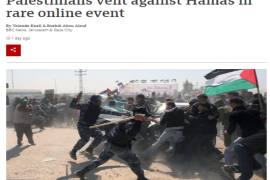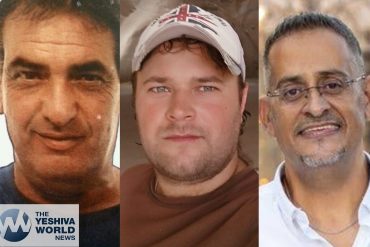Three days after the Palestinian Authority representative in London, Husam Zomlot, had given a briefing to “senior BBC correspondents and journalists” at Broadcasting House, listeners to the June 20th edition of BBC Radio 4’s ‘Today’ programme heard a remarkably sympathetic and unchallenging interview with his colleague Saeb Erekat.
Presenter Mishal Husain introduced the item (from 2:33:34 here) thus: [emphasis in italics in the original, emphasis in bold added]
Husain: “There will be a conference next week in Bahran initiated by the United States on proposals for the Palestinian economy. The Palestinian leadership however will not be there. Indeed the draft agenda for the event doesn’t include the word Palestinian, talking instead about investment in the West Bank and Gaza. Israel’s government will be represented as will the UAE, Qatar and Saudi Arabia. It’s all part of the ‘deal of the century’ as Donald Trump calls his Middle East peace initiative with his son-in-law Jared Kushner at the helm. Saeb Erekat is one of the most senior and long-serving Palestinian officials; a negotiator of the Oslo Accords in the 1990s and now secretary of the Palestine Liberation Organisation’s executive committee. He’s here in London and is with us in the studio. […] What do you achieve – you as the Palestinian leadership – by boycotting this event?”
In contrast to that highlighted claim from Husain, the Times of Israel reported the previous day that:
“No Israeli officials were invited to the event, the US administration announced earlier this week, noting that, given the fact that Palestinian Authority refused to attend, the hosts did not want to politicize the event.”
Erekat opened with an unsupported claim.
Erekat: “First of all we did not know about this event to begin with. We heard about it from the BBC. No-one consulted us and as for the ‘deal of the century’ you mentioned, Mishal, I think they have been implementing it, dictating it…”
Husain: “The Americans.”
Erekat: “The Americans, you know, in turning Jerusalem as Israel’s capital, moving the embassy, closing our office in Washington, closing their consulate, calling settlements legal. When was the last time…today it’s been 28 months for this Trump team in office. Did you hear the term from them two states? Did you hear the term occupation? Did you hear the term settlements illegal? So they’re inviting for a Manama workshop because they know what’s best for me. I should not think any more. They know what’s better for me. They want to link me, my Jericho home, Nablus, Hebron, Ramallah with settlements so we can co-exist because in their eyes I’m not a people.”
Making no effort to clarify to listeners why the PLO mission in Washington was closed or why the US Consulate was merged with the embassy in Jerusalem, Husain not only failed to challenge Erekat’s claims but added credence to them.
Husain: “But what are your options in the face of an administration that takes that position?”
Erekat: “I not declare war on them. They declare war on our rights. And the whole aspects they’re doing now is they trying to…they focus attention from the Palestinian rights to Palestinian needs. What I mean by this, they want to go with the settlers council’s plan – the Israeli settler council’s plan – which specifies the term one state, two system: apartheid. They want me to have the right to have an ID card; it’s gonna be green, theirs will be blue. I have the right to study but they will determine the books and the maps that my children will study or not study. They will determine how do I drive and where do I drive. My car licence will be white and green; theirs will be yellow. There’s a deeper apartheid system that exist in the West Bank and Israel today than the one that existed in the darkest hours of South Africa’s apartheid. What we’re trying to tell the world – what I’m here in Britain, in Europe, in the Arab world, Asia, Africa, Latin America – we must stand tall to defend international law. We must stand tall to defend the four Geneva Conventions. We must stand tall to solve this problem by peaceful means.”
Husain made no effort to challenge Erekat’s ‘apartheid’ smears or to clarify the basis for his bizarre claims concerning the colours of various imaginary documents. Her passive approach was rendered even more significant just seconds later when – contradicting his own claims of a “plan” – Erekat admitted that he has no idea what the US proposals include.
Erekat: “Actually this American administration is telling us if you accept what we offer – and we don’t know what they offer; you don’t know in Britain what they offer, France doesn’t know, no Arabs know, they didn’t share…”
Husain: “The plan was supposed to be presented around now but it’s been delayed because of the Israeli election having to be…”
Erekat: “That’s exactly it. It’s because of the Israelis and because of their…they work it out and draft it with Netanyahu, they dictate it on us.”
Following two questions concerning the participation of Arab states in the conference – and some uncharacteristically muted answers from Erekat – Husain continued:
Husain: “OK. You said the focus has been put on Palestinian needs rather than Palestinian rights but in terms of those needs, you would accept – wouldn’t you? – the…the dire economic position that the Palestinian Authority is in. It’s had aid cut off by the Americans. You know, there are all sorts of programmes which are desperately under-funded, both in the West Bank and in Gaza. So economic proposals are needed, are they not?”
Erekat: “So the Americans, as you said, cut $844 million from my aid. They cut aid to the St. John’s hospital in East Jerusalem – a British institute – the only eye centre serving Palestinians. They cut aid to the only cancer centre, Augusta Victoria…”
Husain: “Which is why I ask you; don’t you welcome the economic proposals given that situation?”
Erekat: “If you believe…Mishal, the people who cut aid to hospitals, to schools…they defunded UNRWA for the refugees $350 million and they left 112 projects – roads, schools, hosp…unfinished. And you’re telling me these people do care about my prosperity? And they want to do projects for me? The Israelis are withholding my funds, my revenues and the Americans are cutting all my aid and now they have these tears on [for] me?” […]
Husain did not bother to tell listeners that it is the PA which has refused to accept transfers of tax revenues from Israel or that the PA also refused to accept a category of US aid and that in both cases the background is linked to the Palestinian Authority’s payment of salaries to terrorists.
Husain: “I want to ask you: you’ve worked on these issues all of your adult life. Do you think you will see a Palestinian state in your lifetime or are you in the process of having to face reality and perhaps giving up on it?”
Erekat: “I…I cannot give up. I will not give up. It’s not a job that I do. I have 8 grandchildren, four children. I don’t want them to be suicide bombers. I don’t want them to be desperate because desperation will lead to desperate acts. And the only option for us as Palestinians as my president specified in his proposal for the United Nations Security Council February 20th 2018 – live and let live. The State of Palestine with East Jerusalem as its capital to live side by side the State of Israel in peace and security. This is the only solution.”
Husain made no effort to ask Erekat how he intends to get Hamas and other Palestinian terror factions on board with that vision.
Erekat: “Now we have an Israeli government, an American administration that want one state two systems: apartheid. This will not fly.”
Once again failing to challenge that ‘apartheid’ smear, Husain closed the item.
Husain: “Saeb Erekat – thank you very much.”
Obviously this was much less an interview intended to provide BBC audiences with accurate and impartial information which would enhance their understanding of the topic than it was the provision of an unquestioning – if not obsequious – platform for Saeb Erakat’s propaganda.
Related Articles:
BBC News report on US closure of PLO mission fails to adequately inform
No surprises in BBC News website report on US Consulate closure
The story about US aid to Palestinians that the BBC chose not to report
PA’s self-inflicted financial crisis continues to be ignored by BBC
BBC journalists get a ‘briefing’ from a past interviewee




